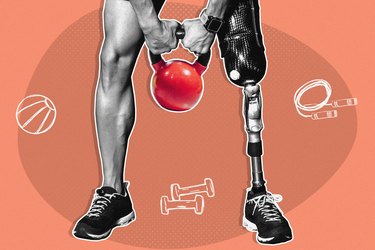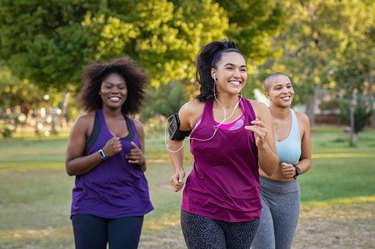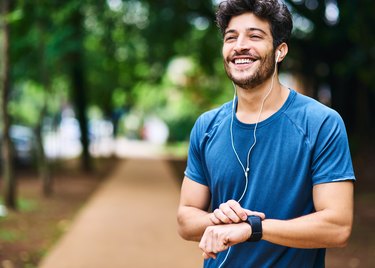
Whether you're lacing up running shoes for the first time or learning to lift a barbell, tapping into a new fitness routine is an exciting time. Think of it like the first day of school: You get to buy new clothes, invest in gear and potentially make new friends.
Plus, the positive changes you'll notice in both your mental and physical state are incredibly motivating. Regular exercise can help lower your risk of type 2 diabetes, obesity and arthritis, as well as increase your energy and help you sleep better, according to the Centers for Disease Control and Prevention.
Video of the Day
Video of the Day
But what exactly is going on in your body as theses changes take place? "It really all depends on the type of exercise, duration and if you've exercised before," says Douglas Comeau, MD, a sports medicine specialist from Boston Medical Center. But you'll generally experience growth in muscles, an increase in energy, a stronger immune system and an uptick in energy levels.
As for when you should expect to see the benefits, some you'll experience right away, like an increase in energy. Others, like muscle gain or fat loss, might take a month or two for results to show. "Improvements in body composition (your ratio of muscle to body fat percentage) can be evident in the first month or two of a resistance training program," says Dr. Comeau.
If you're curious exactly how and why all these changes occur, below, experts break down a behind-the-scenes look at what happens all over your body — inside and out — when you start exercising.
Your Heart
Physical activity leads to aerobic adaptations that help increase blood flow through your heart, sending more oxygen to your organs and muscles. Working out can also improve your blood pressure, lower your resting heart rate and decrease cholesterol levels, all of which help reduce your risk of death from cardiovascular disease, according to the American Heart Association.
Your Muscles
If you've never worked out before (or are returning after a hiatus), there's a good chance you'll feel achy. Engaging muscles you haven't used before or in a way they haven't been used before will lead to some soreness. But pain is different than soreness.
"If you do have muscle soreness, you can use ice to calm inflammation, and small stretching can also be helpful," says Dr. Comeau. If it's pain, however, stop whatever exercise you're doing and contact your healthcare professional or schedule an appointment if the pain doesn't go away.
Muscle soreness differs from pain in that soreness results from your muscles being used in a way they aren't used to. For example, if you are doing intense exercise or introducing a new workout to your routine, you may feel some muscle soreness for a few days. However, if you're experiencing pain, it will feel more constant and intense. Pain doesn't resolve on its own and usually comes back, so it's best to consult with a healthcare professional for the right treatment.
In addition to feeling a little sore, regular exercise improves muscle gain (looking at you, abs). Exercise causes micro-tears in your muscle fibers and connective tissues, according to the Cleveland Clinic. But don't worry, this is a good thing! With rest and proper nutrition, these small tears build back up and make your muscles stronger — and bigger.
Your Brain

Exercise is beneficial for your noggin' for many reasons. As mentioned above, physical activity increases blood flow, especially to your brain, which can decrease your risk of dementia, according to a 2019 study published in BMC Public Health.
Your Immune System
Though exercise has positive effects on your risk of developing heart disease, its connection to the common cold is a little less clear. However, one theory suggests that the increase in circulation (and thus, antibodies and white blood cells) can help the body detect and fight off invaders more quickly.
What is clear? "If you are somebody who ramps up too intensely to start with, chances are your immune system is actually going to be challenged," says Ariane Hundt, certified fitness trainer and clinical nutritionist.
For example, if you've never run and suddenly run 8 miles, your body releases cortisol and norepinephrine, which triggers the body to go into fight-or-flight mode. This mode means the body focuses on only the essentials and may not have enough resources to protect itself.
Your Hormones

You're exercising more than you previously were, so that means you can eat more, right? It depends on your exercise level and goals, such as weight loss or weight maintenance, says Dr. Comeau.
"If you're used to eating a lot and not exercising, you may not be as hungry in the middle of the day as you were before," he says. But if you do feel hungry, make sure you're not misinterpreting thirst pangs, and don't overeat just because you feel like you're burning a ton of calories.
Exercise can stimulate the metabolism when you're just starting out, says Hundt, but your metabolism learns to adapt. For example, someone who has been sedentary but starts walking daily will see increased calorie burn, but after a while you no longer burn the same amount of calories. She recommends changing your workout frequently and adjusting your nutrition accordingly to keep making adaptations to aerobic training.
In addition, women in particular may feel sweet cravings kick up due to the stress of workouts, says Hundt. An hour-long walk in the park doesn't create stress in the body, but an hour-long run can kick up metabolic stress and cravings, she says.
Your Energy Levels
Feel like the Energizer Bunny after a good sweat? If you're a frequent gym-goer and you just crushed a workout, you may feel that burst of pep right after, says Dr. Comeau. "If you haven't been exercising, you might initially feel fatigued, but after a couple of days, that energy will surge and you'll feel more productive from working out," he says.
Related Reading
- BMC Public Health: Physical exercise for prevention of dementia (EPD) study: background, design and methods
- Centers for Disease Control and Prevention: Childhood Obesity Facts
- AHA: "What's the Link Between Physical Activity and Health?"
- Obesity Facts
- Centers for Disease Control and Prevention: Physical Activity Basics
- 6 Best Recovery Tips
Was this article helpful?
150 Characters Max
0/150
Thank you for sharing!
Thank you for your feedback!
Is this an emergency? If you are experiencing serious medical symptoms, please see the National Library of Medicine’s list of signs you need emergency medical attention or call 911.
